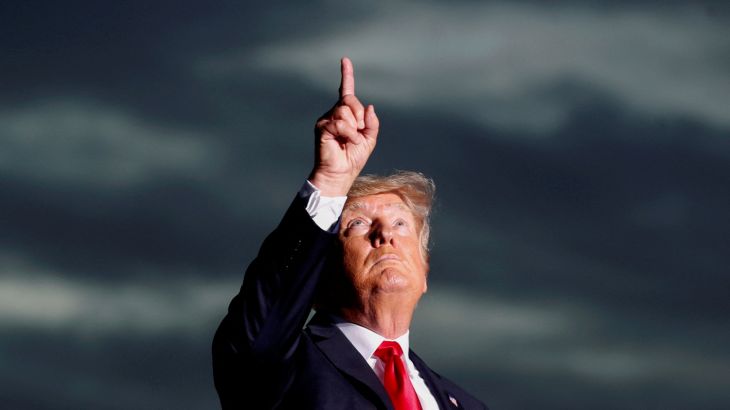What is an indictment? All to know about Donald Trump’s case
All the key questions surrounding former US president’s legal case answered.

Donald Trump has become the first former United States president to be charged with a crime for his alleged role in covering up a hush-money payment before the 2016 presidential election.
Here’s what to know about the indictment and the case:
Keep reading
list of 4 itemsWhat happens next following Trump’s indictment?
Donald Trump’s Stormy Daniels case: Here’s what you need to know
Trump indicted in New York, expected to be arraigned next week
What is an indictment?
According to the US Department of Justice, an indictment is the process when a person receives a “formal notice that it is believed that they committed a crime”.
The indictment contains the basic information that informs the person of the charges against them.
It takes place after a grand jury examines all potential evidence to decide whether a crime was committed. If the jury decides there is enough evidence, an indictment will come.
In this case, the grand jury in New York City, which has been meeting since January, indicted Trump after hearing testimony from a number of witnesses. The specific charges are not yet known, and the indictment will likely be announced in the coming days.
What was Trump indicted for?
The grand jury voted to indict Trump after months of hearing evidence about a $130,000 payment to porn star Stormy Daniels in the waning days of the 2016 election campaign. The money was allegedly intended to buy her silence about the encounter she says they had years before.
Trump’s former personal lawyer and fixer Michael Cohen has said he coordinated with Trump on the payments to Daniels and to a second woman, former Playboy model Karen McDougal.
The former president has denied the affair and any wrongdoing. He has said the payment was to protect his reputation from a false accusation.
While the specific charges were not clear, several US media outlets had reported before Thursday’s indictment that the potential charges relate to the way Trump reimbursed Cohen, with prosecutors alleging he improperly labelled the payments as legal expenses.
The charge, normally a misdemeanour, could be upgraded to a felony if prosecutors link the payment to violations of election law, which cap donations to political candidates at $2,700 per individual and require them to be made public. The payment to Daniels, right before the 2016 vote, could be considered an illegal campaign contribution.
What has Trump said?
Trump has denied Daniels’ claim, and his lawyer has accused Daniels, whose real name is Stephanie Clifford, of extortion.
Calling himself “a completely innocent person”, he cast the indictment as the latest in a line of actions that he says are designed to “destroy” his Make America Great Again movement.
The former president also accused Manhattan District Attorney Alvin Bragg, the Democrat who led the investigation, of trying to hurt his electoral chances.
“This is Political Persecution and Election Interference at the highest level in history,” Trump said in a statement, calling Bragg a “disgrace”.
Is this the only investigation that Trump is facing?
Beyond the Manhattan case, Trump is facing an array of other investigations.
On the federal level, the Department of Justice is investigating the retention of top-secret government documents at his Florida estate, Mar-a-Lago, and efforts by Trump and his allies to overturn the results of the 2020 election.
The efforts by many of the same players in the latter case were also the subject of a special grand jury investigation in the state of Georgia. The panel’s foreperson said the special grand jury recommended multiple criminal indictments.
With many serious cases looming around the other investigations, some legal experts have questioned the wisdom of the Manhattan case becoming the first to result in charges.
What have been the reactions?
Republicans framed the indictment as a political prosecution, accusing Bragg of weaponising the criminal justice system.
Democrats were less vocal in the hours after the indictment became known, but some of the former president’s critics have described the case as a long-overdue dose of accountability.
President Joe Biden, a Democrat who is expected to announce he is running for re-election next year, has not yet commented.
What follows next?
A judge will likely unseal the Manhattan charges in the coming days, and Trump will have to travel there to be fingerprinted and photographed, known as a surrender date, which a court official said was expected on Tuesday.
He will then appear before a judge and be formally charged, followed by a decision on whether he should be released on bail or taken into custody.
If Trump indeed turns himself in, a relatively quick process and release is expected. A former president is not likely to be paraded in cuffs across a pavement or through a crowded court.
Legal experts say that any potential trial is still at least more than a year away, raising the possibility that the former US president could face a jury in a Manhattan courtroom during or even after the 2024 presidential campaign as he seeks a return to the White House.